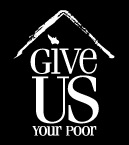This entry is about global extreme poverty. It looks at solutions that may have implications about homelessness in the U.S. which is where Paul Polak's interest in poverty began.
Paul Polak is in his mid seventies, witty and funny, and has an old school charm that is engaging and even comforting as he throws his revolutionary ideas and stunning facts at you. If they made a Paul Polak doll I would buy one. A psychologist by training, Paul has spent the last 25+ years working at alleviating extreme poverty for those living at the "base of the pyramid (BOP)" and released a book in 2008 called, Out of Poverty: What Works When Traditional Approaches Fail. I heard him speak at a breakout session at Pop!Tech.
The Base (or bottom) of the Pyramid is an expression popularized in C.K. Prahalad's The Fortune at the Bottom of the Pyramid: Eradicating Poverty through Profits (2005). The BOP is the 4 billion people, the majority of human beings, that together make up a huge potential market. Prahalad believes "if we stop thinking of the poor as victims or as a burden and start recognizing them as resilient and creative entrepeneurs and value-conscious consumers, a whole new world of opportunity will open up" for both poor people and businesses. He adds that serving the BOP will "demand innovations in technology, products/services, and business models, and require large firms to work collaboratively with NGOs and local government." This collabrative approach is a big part of IA's Accelerator Expedition.
Polak is all about the BOP. The NGO he founded, IDE, has helped 17 million people out of extreme poverty in 25 years. Its approach is to apply business models to help extremely poor entrepeneurs with innovative design of their products and to creatively and effectively bring those products to market.
He believes that there needs to be a revolution in how multinational corporations design and market to people at the BOP. In his Wed. presentation, after Bunker Roy showed the amazing work and ingenuity of poor, illiterate women, young and old, and others were doing at the Barefoot College, Polak asked, "What if we had a million amazing barefoot people, and designed a package that a multinational corporation develop as an offering to them as franchisees? What if you franchised these 1 million folks and had a product they could sell to poor people. There would be money to be made for investors, for the franchisees, and products that could help the poorest people out of poverty (e.g., efficient lighting, watering systems for small farmers, cheaper electricity, etc.)
"We need a revolution where you can create a revenue stream for the poor person and the parent company," Paul exclaimed. He talked about combining vital products with "the ruthless pursuit of affordability" for true sustainables solutions. So, embrace the profit model and we'll create a true revolution when big business enters the market place for poor people because it makes money. Once there exists a workable model, the marketplace responds and soon big corporations start tweaking products that have a real benefit to poor consumers. The world runs on bottom line process, he says.
For part II of II of this blog click here.
Thursday, July 8, 2010
At the base of the pyramid with Paul Polak (Part I of II)
Subscribe to:
Post Comments (Atom)



1 comment:
Thanks for this great blog about Paul Polak's work! FYI Paul has begun blogging every Friday @ http://blog.paulpolak.com/
Post a Comment